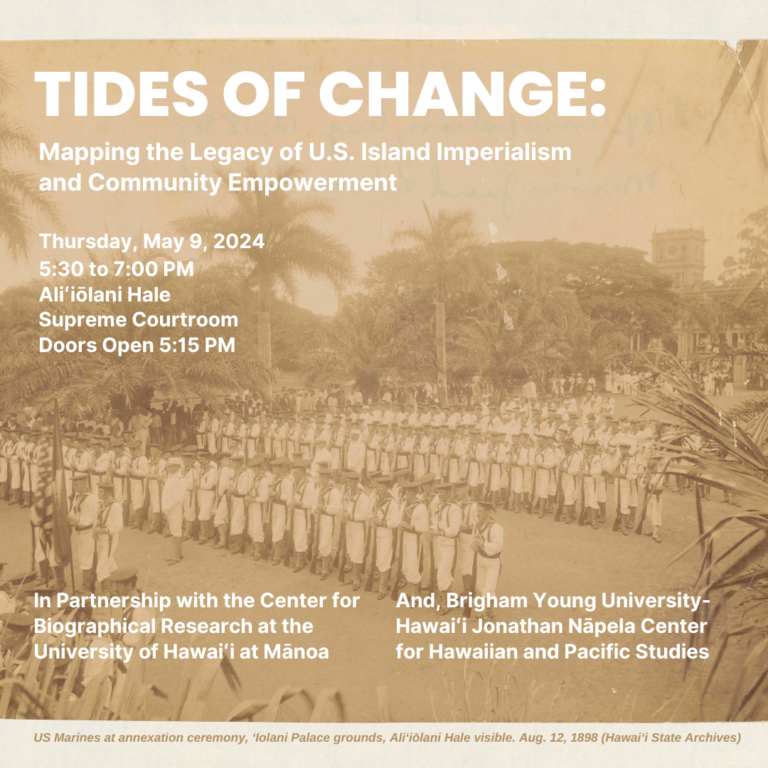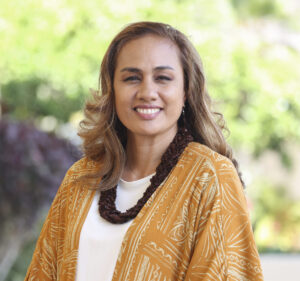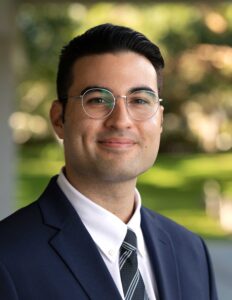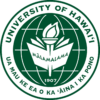
Tides of Changes: Mapping the Legacy of US Island Imperialism and Community Empowerment
Aliiolani Hale
Thursday, May 9, 2024
5:30 to 7:00 PM
Since the 19th century, the United States has laid claim to and exploited numerous islands worldwide, employing ambiguous legal terminology, exclusionary policies, and white supremacy to maintain control. Today, in addition to Hawaii, these island regions encompass the unincorporated territories of Puerto Rico, US Virgin Islands, Commonwealth of the Northern Mariana Islands, Guahan (Guam), and American Samoa, where residents are denied full constitutional protections; and the freely associated states of Palau, Marshall Islands, and Federated States of Micronesia, whose citizens can live and work in the US without a visa, but must often navigate social, political, and economic discrimination to do so.
Despite being touted by the US government as “mutually beneficial”, island communities endure social, cultural, and environmental degradation from military occupation. From Pohakuloa on Hawaii Island to Kwajalein Atoll in the Marshall Islands, the US has treated ancestral homelands as weapons testing sites, meanwhile providing inadequate federal relief support following human- and climate-induced disasters, in places such as Puerto Rico, Maui, and the Northern Mariana Islands. The “Tides of Change” program convenes experts living and working in islands impacted by US imperialism to address shared obstacles and explore paths of resistance.
Today, US island imperialism manifests in regional militarization and roadblocks to self-determination. In Palau, the Federated States of Micronesia, and the Mariåna Islands, US forces are occupying new military installations, prompting anxiety, resistance, or sometimes accommodation. Meanwhile, debates over political status in Puerto Rico and American Sāmoa continue to expose the injustices facing people in unincorporated territories. In Part I of “Tides of Change: Mapping the Legacy of US Island Imperialism and Community Empowerment,” panelists discuss the legal, political, and community tools that Pacific Islanders use to navigate or subvert US imperialism.
 Dr. Line-Noue Kruse has a doctorate in philosophy from the University of Hawaii at Manoa specializing in global citizenship and empire, territorial federalism, comparative international law and native land law. Her book, The Pacific Insular Case of American Samoa: Land Rights and Law in Unincorporated US Territories has been cited in district and circuit courts and as a foundational text to understand land tenure and constitutional territorial doctrine in legal pluralistic American societies. Line-Noue teaches in Pacific Studies at Brigham Young University-Hawaii concentrating on land tenure and legal pluralism, gender studies, and the intersections between nature, environment, and sustainability. She is the associate editor of the Pacific Studies journal and editor of the Intersections student journal. She taught Pacific History at National University of Samoa while co-editor of the Faatufugaga Journal of Faculty of Arts concurrently while taking law classes at the University of South Pacific law programme. Line-Noue was also a professional planner in Oceania and America, she was the first Samoan territorial planner in the American Samoa Government Department of Commerce and member of the Heads of Planning and Statistics in the Pacific Community (formerly South Pacific Commission) as well as a transportation planner in California. She has published on native land tenure, women’s history in Oceania, systemic national planning, foreign land tenure, Pacific Studies in Hawaii, and the dispossession of native land by foreign law and policy.
Dr. Line-Noue Kruse has a doctorate in philosophy from the University of Hawaii at Manoa specializing in global citizenship and empire, territorial federalism, comparative international law and native land law. Her book, The Pacific Insular Case of American Samoa: Land Rights and Law in Unincorporated US Territories has been cited in district and circuit courts and as a foundational text to understand land tenure and constitutional territorial doctrine in legal pluralistic American societies. Line-Noue teaches in Pacific Studies at Brigham Young University-Hawaii concentrating on land tenure and legal pluralism, gender studies, and the intersections between nature, environment, and sustainability. She is the associate editor of the Pacific Studies journal and editor of the Intersections student journal. She taught Pacific History at National University of Samoa while co-editor of the Faatufugaga Journal of Faculty of Arts concurrently while taking law classes at the University of South Pacific law programme. Line-Noue was also a professional planner in Oceania and America, she was the first Samoan territorial planner in the American Samoa Government Department of Commerce and member of the Heads of Planning and Statistics in the Pacific Community (formerly South Pacific Commission) as well as a transportation planner in California. She has published on native land tenure, women’s history in Oceania, systemic national planning, foreign land tenure, Pacific Studies in Hawaii, and the dispossession of native land by foreign law and policy.
 Josie graduated from Xavier High School in Micronesia and attended the Community College of Micronesia. She later transferred to the University of Hawaii at Hilo studying Biology, Anthropology, and Pacific Island Studies in 1989, making her one of the first Micronesians migrating under the Compact of Free Association Treaty. Josie earned her Master’s degree in Social Work and is now working as Chief Executive Officer for We Are Oceania. She is a native of Onoun Island in Micronesia, and speaks Chuukese, Onounese, and English fluently.
Josie graduated from Xavier High School in Micronesia and attended the Community College of Micronesia. She later transferred to the University of Hawaii at Hilo studying Biology, Anthropology, and Pacific Island Studies in 1989, making her one of the first Micronesians migrating under the Compact of Free Association Treaty. Josie earned her Master’s degree in Social Work and is now working as Chief Executive Officer for We Are Oceania. She is a native of Onoun Island in Micronesia, and speaks Chuukese, Onounese, and English fluently.
 Henderson Huihui is a Staff Attorney for the Native Hawaiian Legal Corporation’s Ohana Services practice group. Henderson’s practice focuses on addressing the issues and concerns of Hawaiian Home Lands leasee families through legal and other advocacy. As a fourth-generation homesteader from Waimanalo, Henderson is proud to now ensure that other Hawaiians have the legal services they need to manage risks to leaseholds and protect their family’s connections to these lands. Henderson’s traditional cultural practices include mahiai kalo and surfing.
Henderson Huihui is a Staff Attorney for the Native Hawaiian Legal Corporation’s Ohana Services practice group. Henderson’s practice focuses on addressing the issues and concerns of Hawaiian Home Lands leasee families through legal and other advocacy. As a fourth-generation homesteader from Waimanalo, Henderson is proud to now ensure that other Hawaiians have the legal services they need to manage risks to leaseholds and protect their family’s connections to these lands. Henderson’s traditional cultural practices include mahiai kalo and surfing.
 Keoni M. Williams is an information and publications officer at the Pacific Islands Development Program, a program of the East-West Center dedicated to serving the nations and peoples of the Pacific through capacity building, interchange, and policy-relevant research. Previously, he served as editor-in-chief of the Asian-Pacific Law & Policy Journal and program director at Pacific Forum. Keoni is of Chuukese and Welsh decent and has lived in Aotearoa New Zealand and Korea. He earned his Juris Doctor from the William S. Richardson School of Law while he was a Graduate Degree Fellow at the East-West Center, and he holds a dual B.A. in communications and Korean from the University of Hawaii at Manoa, having studied for one year at Korea University.
Keoni M. Williams is an information and publications officer at the Pacific Islands Development Program, a program of the East-West Center dedicated to serving the nations and peoples of the Pacific through capacity building, interchange, and policy-relevant research. Previously, he served as editor-in-chief of the Asian-Pacific Law & Policy Journal and program director at Pacific Forum. Keoni is of Chuukese and Welsh decent and has lived in Aotearoa New Zealand and Korea. He earned his Juris Doctor from the William S. Richardson School of Law while he was a Graduate Degree Fellow at the East-West Center, and he holds a dual B.A. in communications and Korean from the University of Hawaii at Manoa, having studied for one year at Korea University. Meagan Harden is a Ph.D. candidate in the Department of Geography and Environment at the University of Hawaii at Manoa. Her research examines American imperialism in island spaces, focusing particularly on the production of spatial imaginaries and the ways in which communities resist or redefine them. With an M.A. in International Studies and a graduate certificate in Women’s and Gender Studies from the University of Oklahoma, Meagan uses critical and feminist geopolitical frameworks to disrupt classical geopolitical paradigms representing islands and islanders as peripheral agents in international relations.
Meagan Harden is a Ph.D. candidate in the Department of Geography and Environment at the University of Hawaii at Manoa. Her research examines American imperialism in island spaces, focusing particularly on the production of spatial imaginaries and the ways in which communities resist or redefine them. With an M.A. in International Studies and a graduate certificate in Women’s and Gender Studies from the University of Oklahoma, Meagan uses critical and feminist geopolitical frameworks to disrupt classical geopolitical paradigms representing islands and islanders as peripheral agents in international relations.
Mahalo to our Program Sponsors:



Disclaimer: While the Hawaii State Judiciary provides a venue for diverse discussion, speakers’ remarks do not represent opinions of the Judiciary.
